|
|
|
Sort Order |
|
|
|
Items / Page
|
|
|
|
|
|
|
| Srl | Item |
| 1 |
ID:
128461
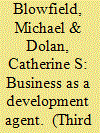

|
|
|
|
|
| Publication |
2014.
|
| Summary/Abstract |
An emphasis on making markets work for the poor has thrust companies into the role of 'development agents' - organisations that consciously seek to deliver outcomes that contribute to international development goals. This paper examines what business as a development agent means in terms of the promise, the conceptualisation and the developmental outcomes of several initiatives engaged in 'bottom billion capitalism'. It argues that, while these initiatives are hailed as a solution for poverty, the benefits of such engagement must be weighed against other factors, including exclusion, the emphasis on capital assets and the reinterpretation of positive outcomes. The paper presents an alternative model of business as a development agent that better meets the criteria for a genuine development actor.
|
|
|
|
|
|
|
|
|
|
|
|
|
|
|
|
| 2 |
ID:
128463


|
|
|
|
|
| Publication |
2014.
|
| Summary/Abstract |
Consumers, partnering with corporations and celebrities, are forming new alliances in international development through what we call 'Brand Aid' initiatives. At a time of shifting relationships between public and private aid, commodities are sold as the means of achieving development for recipients and good feelings for consumers simultaneously. In this article we first formalise our conceptual model of Brand Aid at the triple interface of causes, branded products and celebrities. Then we conduct a systematic empirical analysis of contemporary Brand Aid initiatives, including three in-depth case studies of 'Win One Give One', toms shoes and Product (red). We argue that these not only use imaginaries of development to sell products to Northern consumers but also engage in the work of a 'story factory' - producing truths about international development and consumer engagement that make development appear simplified, manageable and marketable. We conclude that, in Brand Aid, the problems themselves and the people who experience them are branded and marketed to Western consumers (through celebritised multimedia story-telling) just as effectively as the products that will 'save' them.
|
|
|
|
|
|
|
|
|
|
|
|
|
|
|
|
| 3 |
ID:
128468
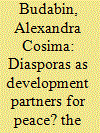

|
|
|
|
|
| Publication |
2014.
|
| Summary/Abstract |
There is increasing interest today in the relationship between diaspora groups and international development. As a stand-in for the domestic organisation in Keck and Sikkink's model of a 'transnational advocacy network', diasporas serve as important sources of legitimacy and first-hand knowledge to support the 'information politics' of host country ngos; in turn, diasporas gain access to policy making around development and conflict resolution. But these alliances present a complicated picture of power and agency with unevenness across actors. Using field research on the US-based ngo Save Darfur Coalition and its partnership with the Darfuri diaspora, I argue that a host country ngo must balance its relationships across numerous stakeholders, including the diaspora, as well as short and long-term development needs. In addition, the strength of the alliance across actors may be influenced by the status of the diaspora and the home and host country contexts.
|
|
|
|
|
|
|
|
|
|
|
|
|
|
|
|
| 4 |
ID:
128467
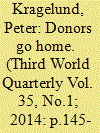

|
|
|
|
|
| Publication |
2014.
|
| Summary/Abstract |
The international development arena is currently subject to major changes in the geographies of power. In this article I analyse how and to what extent the (re)entry on the development scene of China, India and Brazil, together with increasing prices for primary commodities and improved access to international finance, has affected Zambia's political leverage to set, implement and fund its own developmental policies. I argue that, while real changes in external financial flows comparable to aid from these non-traditional state actors are still small, these actors' experience is providing Zambia with an alternative development model that combines purposive state intervention with market-based economic growth and integration into world markets. While Zambia may be taking the first steps in strengthening its 'sovereign frontier', the extent of this movement is still small and its development outcomes are far from assured.
|
|
|
|
|
|
|
|
|
|
|
|
|
|
|
|
| 5 |
ID:
128460
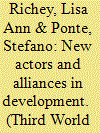

|
|
|
|
|
| Publication |
2014.
|
| Summary/Abstract |
New actors and alliances in development' brings together an interdisciplinary group of scholars exploring how development financing and interventions are being shaped by a wider and more complex platform of actors than usually considered in the existing literature. The contributors also trace a changing set of key relations and alliances in development - those between business and consumers; ngos and celebrities; philanthropic organisations and the state; diaspora groups and transnational advocacy networks; ruling elites and productive capitalists; and 'new donors' and developing country governments. Despite the diversity of these actors and alliances, several commonalities arise: they are often based on hybrid transnationalism and diffuse notions of development responsibility; rather than being new per se, they are newly being studied as practices that are now coming to be understood as 'development'; and they are limited in their ability to act as agents of development by their lack of accountability or pro-poor commitment. The articles in this collection point to images and representations as increasingly important in development 'branding' and suggest fruitful new ground for critical development studies.
|
|
|
|
|
|
|
|
|
|
|
|
|
|
|
|
| 6 |
ID:
128469
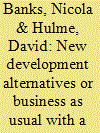

|
|
|
|
|
| Publication |
2014.
|
| Summary/Abstract |
The state, market and civil society constitute the three main institutional domains of the 'development' landscape. Perceptions of these three actors have evolved over time alongside conceptualisations of what constitutes and best promotes 'development'. The array of contributions in this special issue points towards a worrying implication for the transformative potential of development activities and interventions. While the new diversity in actors and alliances brings new opportunities for development, we see the majority placing the responsibility for development in the hands of the state and market. Furthermore, the hollowing out of civil society - apparent from the lack of priority given to it in the Global South and the promotion of development as 'responsible consumerism' in the North - represents a missed opportunity for consolidating the progress made in the commitment to poverty reduction since the UN Millennium Declaration. Reaching greater transformative potential would require focusing as much on inclusive social development as on inclusive economic development. Doing so would tackle the big questions of power and inequality that remain among the root causes of poverty today.
|
|
|
|
|
|
|
|
|
|
|
|
|
|
|
|
| 7 |
ID:
128465


|
|
|
|
|
| Publication |
2014.
|
| Summary/Abstract |
Over the past decade a new form of philanthropy has emerged, termed 'philanthrocapitalism'. Champions of philanthrocapitalism suggest that private giving can fill the void left by diminished government spending on social and development programmes. Critics suggest that philanthropy is no substitute for strong governmental support for social welfare. Both arguments perpetuate a dichotomy between the public and the private, implying that philanthrocapitalism operates in a vacuum largely divorced from governmental interventions. In this article I challenge that assumption, exploring how new philanthropic initiatives have compelled increased financial support from governments toward the private sector. Drawing on three cases - advanced market commitments (amcs) in drug development; impact investing; and direct philanthropic and governmental grants to corporate entities - I illustrate the ways that governments remain one of the most powerful - if not the most powerful - philanthropic actors in the philanthrocapitalist turn.
|
|
|
|
|
|
|
|
|
|
|
|
|
|
|
|
| 8 |
ID:
128466
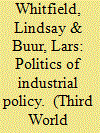

|
|
|
|
|
| Publication |
2014.
|
| Summary/Abstract |
Economic transformation is driven by successfully implemented industrial policy, but industrial policy is inherently political. We cannot understand why some governments pursue and implement industrial policy better than others without understanding its politics. This article addresses the conditions under which industrial policies are successfully implemented. It presents an analytical approach to understanding why some ruling elite-capitalist alliances lead to better economic outcomes than others. Sub-Saharan African countries present a particular puzzle, given their low productive capabilities and the relatively small number of successful productive sectors. The article examines the most successful productive sectors in Mozambique and in Ghana in order to illuminate the conditions under which such alliances occur and their specific characteristics and outcomes.
|
|
|
|
|
|
|
|
|
|
|
|
|
|
|
|
| 9 |
ID:
128464


|
|
|
|
|
| Publication |
2014.
|
| Summary/Abstract |
There has been a proliferation of celebrity within development publicity, media events and representations, which has received little attention from development scholars. This paper charts the rise of celebrity within development, drawing from over 120 interviews conducted with development, media and celebrity professionals. I examine how the presence of celebrity within development is mediated and the political economy of the celebrity-charity-corporate complex which results. I use these findings to interrogate recent writings on the work of celebrity advocacy in development and demonstrate that understanding the production and construction of celebrity development interventions helps substantially in understanding their effects.
|
|
|
|
|
|
|
|
|
|
|
|
|
|
|
|
| 10 |
ID:
128462


|
|
|
|
|
| Publication |
2014.
|
| Summary/Abstract |
This article examines the historical legacy of contemporary development alliances through an analysis of the British government's Empire Marketing Board poster campaign from 1926 to 1933. The primary aim of these posters was to instil in the British public a preference for buying empire-grown goods and the significance of their role as consumers in maintaining the Empire. By conveying messages of a common humanity and invoking a visual language of interdependence between Britain and its colonies, the posters attempted to open up new connections and create new moral communities across distance in ways that are not dissimilar to fair trade campaigns today.
|
|
|
|
|
|
|
|
|
|
|
|
|
|
|
|
|
|
|
|
|